Sorted by date Results 1 - 25 of 139

The climactic scene is the main thing people talk about in South Lane County when this movie comes up. It was literally a train wreck, although metaphorically, it was anything but. Buster wanted the movie's climax to involve a locomotive falling through a burning bridge into a river. With this in mind, although he borrowed the two main lakes from local logging shows, he purchased the third outright. He had plans for that third locomotive that probably would not be approved by its owner unless...

If a Cottage Grove logger had been bonked on the head in January 1926 and woke up six months later, he would have scarcely recognized his hometown. There was a whole new Main Street built way out east of Main Street, with businesses and boardinghouses and banks and everything. Meanwhile, back on the old Main Street, everyone in town was clustered around the Bartell Hotel, dressed in weird, archaic outfits like it was Civil War times. And there were a pair of old steam logging locomotives,...

Oregon, and the rest of the American West, is full of the ghosts of cities and towns killed by a railroad. Central Oregon’s third largest city, Prineville, almost became one of them. Prineville was the first town in inland Central Oregon, founded in 1868. It was located in the Crooked River Valley at Ochoco Creek, at pretty much the most convenient place in Central Oregon for a wagon-road hub serving surrounding farmers and ranchers. It grew fast, like a lot of frontier towns did. By 1900 it was...

When mayors of incorporated cities start talking about growth, it’s hard to beat the story of Steve Smith, who until a few years ago was mayor of the historic mining town of Granite, Oregon. When I spoke to him in 2009, Steve told me Granite’s population had shot up 2,800 percent over the previous 40 years, since 1970. So, what was the secret of Granite’s amazing growth rate? Simple: Start with a really small number. And it didn’t get much smaller than Granite’s population in 1970. At that time,...

The thing was, by late 1883, the Vigilantes’ popularity had collapsed, and they didn’t know it. Basically, by this time, everyone who wasn’t one of them was an opponent — but, of course, nobody dared say so. But several of the other folks in the saloon that night were happy to trot on over to Blakely’s place and tell him what Winckler had said about him, and Blakely was furious. He and several friends charged down to the saloon, but by the time they got there the Vigilantes had gone home. The...

In the months that followed the murders of A.H. Crooks and Stephen Jory, as detailed last week in Part One of this two-part series, the members of the mob that lynched their killer formed themselves into a secret shadow government. They became known as simply “the Vigilantes,” and although they undertook their operations wearing masks and under cover of darkness, everybody pretty much knew who they were. And that was a problem because who they were was the cream of Prineville’s social elite...

It was the Ides of March — March 15, 1882. A man named A.H. Crooks had filed a homestead claim on a piece of land near Prineville. He and his hired hand, Stephen Jory, were out on the land now, cutting blaze marks on trees along the property line. Except, it wasn’t the property line. The clerk in the county seat, way up in The Dalles, had made a mistake and tried to give Crooks a big slice of the homestead next door, which was owned by a cantankerous fellow named Lucius Langdon. Crooks and Jory...

The problem with opium was, that although the stuff was still legal, it was taxed very heavily. That meant smuggling the stuff in without paying the tax was tantamount to stealing money from the government. When Dunbar smuggled a Chinese guy into the country to work, that was illegal, but nobody cared; it was a big country, and there was lots of work to be done. But when Dunbar smuggled a barrel of opium into the country, the government lost thousands of dollars in tax revenue. Most likely,...

One of the most significant events in the history of the world took place in 1892, when a corrupt political hack named James Lotan managed to land a cushy government job as the head of the customs inspection service for the Port of Portland. Believe it or not, Lotan’s landing that job led directly to Pearl Harbor and eventually Hiroshima and Nagasaki, and indirectly to the defeat of Nazi Germany in Europe. Not bad for a small-time white-collar criminal in a tiny backwater seaport town on the f...
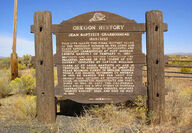
It should be stressed that this was before Europe and European America had learned contempt for Indians. Before about 1825, tomahawks were thrown and scalps were taken on both sides (especially during the War of 1812), but being half-Indian was nothing that any métis youth would be ashamed of. That would happen later, and Charbonneau would be there watching it happen. In the meantime, it was still the early 1820s and Charbonneau was most likely the talk of the town everywhere he and Duke Paul...

It’s really easy, looking back at history, to think stuff was “meant to be.” When we look back at how the American West was incorporated into the nation, we see it was shaped in the spirit of Manifest Destiny. We see settlers from the east moving out and seizing big chunks of Indian lands, claiming it was God’s will and pointing to the pandemics that were decimating the tribes as a sort of Old Testament-style confirmation of their status as God’s chosen new landowners. The course of Western h...

Anyone who’s done much driving around Oregon — especially along the coast — knows the state’s bridges have a particular and distinctive style. That style is hard to put your finger on, isn’t it? The bridges themselves are very different from one another. Many of them aren’t even built with the same materials. The spectacular structure that soars over Coos Bay could not be much different in size, technique, and style from the elegant little archway that links Oregon City with West Linn; but e...

Conde McCullough had a problem. Let’s restate that. The Iowa highway department, which McCullough worked for at the time (in 1914), had a problem; what McCullough had was an opportunity. His solution to Iowa’s problem would, several years later, enable him to write his own ticket, and the name he would write on that ticket in the “destination” category would be “Oregon.” But at the time, that happy day was several years in the future and was far from certain. The problem the highway department...

Continued From Last Week The Waco’s engine droned on. Ted couldn’t understand why it was still running. It should have sipped its last drop of gasoline several minutes ago. Sooner or later it would run out, and Ted would have to do his best at a dead-stick landing in the black, gusty night, unable to see the ground below. The most likely outcome would involve him thinking he was just above the ground when he wasn’t — it’s very hard to deliberately fly into the ground, and the instinct to pull ba...
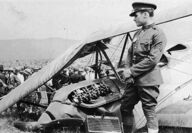
On a gusty late-summer evening in 1930, well after dark, a few feet off the ground near the Oregon-Nevada border, 22-year-old Ted Barber was hurtling through the blackness, preparing to die. Barber was an aviation pioneer and an actual barnstormer — a pilot who paid the bills by making the circuit of county fairs and country dances, selling airplane rides and flying lessons, and performing daring tricks like wing-walking and inverted low passes. His ”ship” was a Waco 9, a primitive but rugge...

Continued From Last WeekI In the course of doing this, Cressman gleaned an understanding of the cultures of “ancient Oregonians” — an understanding that formed into a theory that put him at odds with the conventional wisdom of nearly every other scientist at the time. Essentially, every archaeologist but Cressman was convinced that the Clovis People, an ancient culture named after a New Mexico town where their artifacts had been first discovered, had been the first humans to ever live in North...

In the summer of 1981, a little action-adventure movie titled Raiders of the Lost Ark came out, and fans have been speculating ever since on whom the character of Indiana Jones might be based. The most popular speculation — Vanity Fair magazine goes so far as to opine that he is “almost certainly” the basis for Jones — is Roy Chapman Andrews, a globe-trotting paleontologist and former director of the American Museum of Natural History. Well, the fact is that Jones probably wasn’t based on...
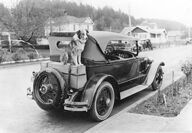
Up until his untimely death from a fall in 1937, Rogue River Wilderness mountaineer and mule-train driver Hathaway Jones enjoyed a reputation as the “damnedest liar” in all the West Coast states and probably a couple dozen inland ones too. And he was proud of that reputation. When the Portland Morning Oregonian referred to another backwoods character as the “biggest liar in the country,” Hathaway claimed he was going to sue the paper for defamation. (As a side note, that competitor for the “bi...
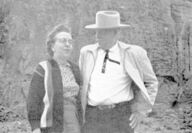
Part Two: Legendary raconteur Reub Long, the “Sage of Fort Rock,” packed a whole lot into his 76 years living in central Oregon. Most of it — though by no means all — had to do with horses. “The ranch I have and the things I’ve done were due to horses,” he wrote in his book. “I had workhorses for hire by contractors for freighting, haying, or construction jobs; I owned riding and pack horses for running dude outfits in the mountains; I raised riding horses to sell; I supplied bucking horses...
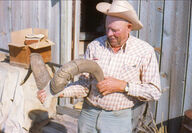
The tiny town of Fort Rock, Oregon, is famous for two things: The 14,000-year-old sandals found in a cave nearby, and Reub Long. It’s been a while — nearly 50 years since Reub died at age 76, in the summer of 1974. But even today, among old Oregon wits and raconteurs and cowboy poets, Reub plays number two to nobody. Perhaps Stewart Holbrook could have given him a run for the money; but Holbrook was a journalist, so his storytelling was constrained by a sense of duty to stick mostly to the fac...

Part Three “KLONDIKE KATE” ROCKWELL had visited Central Oregon before, and been deeply impressed by the beauty of the high desert. Now it seemed like just the place to get away from all things Vaudeville, to forget Pantages, to re-center herself. And she had friends there — although actually, she had friends almost everywhere, among the former sourdoughs of the Klondike gold rush. And, the Oregon High Desert country at that time (circa 1910) was one of the last parts of the continental U.S....

Part Two Kathleen Eloise Rockwell was born in Kansas in 1876 and grew up in Spokane and Valparaiso, Chile. At age 18 she left home, moved to New York, and took a job as a chorus girl. It was the start of a lifelong career as a dancer on the Vaudeville scene. The turn of the century found Kate in Spokane again, working in a variety of theaters there. And that’s where she was when she heard about the Klondike gold rush. She was adventuresome, athletic, and young, and the Klondike offered her t...

Part One Imagine this story playing out on a television or movie screen near you (or a Vaudeville stage!): Fade in on a tall, rugged-looking woman in a bright-red “Sergeant Preston of the Yukon” outfit. We hear a voiceover from a gravel-voiced Narrator: Narrator: “It’s June of 1901. In the Territorial capital of Whitehorse, ‘Klondike Kate Ryan’ is the first woman officer in the history of the Royal North-West Mounted Police, a precursor agency to the famous Royal Canadian Mounted Police, a.k.a....
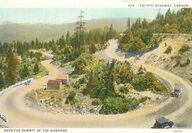
When Hasso Hering, the legendary longtime editor of the Albany Democrat-Herald, first came to Oregon in the mid-1960s, one of the things that struck him was the quality of the roads. “All the roads were wide and smooth and well built,” he said (or words to that effect; I don’t remember verbatim). “There were no potholes. You could go all day. You could drive your Mustang as fast as you wanted, and nobody would bother you. I’d never seen anything like it.” Oregonians of a certain age will know w...

As every sensible person knows, there is pretty much no such thing as being “cruel to be kind.” Sometimes it does work the other way around, though. Now and then you run across a story in which someone did something that was intended as a kindness, but turned out to be anything but. Such a case happened in the office of Oregon Governor Oswald West, sometime in 1912. It had to do with a little shooting scrape that Z.H. Stroud, an acquaintance of West’s, had gotten into in the little front...